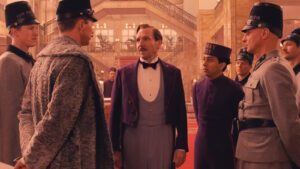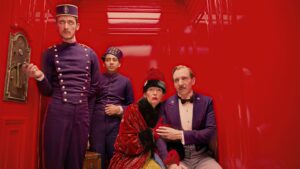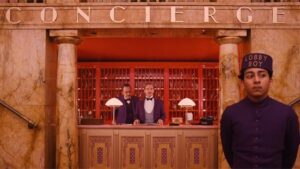Publication Date: 07-19-2023
The Grand Budapest Hotel (2012) review
Dir. Wes Anderson
By: Steve Pulaski
Review: ★★★★
Perhaps the worst thing one can do to Wes Anderson is allow him to roam in a lavish home, area, or in this case, a hotel for several hours because he’ll emerge desperately wanting to make a tour-de-force project. This is exactly what The Grand Budapest Hotel is; a tour-de-force from a director who has had explosive praise and loud criticisms, but one who simply doesn’t care what his critics have to say. He knows what he wants to do, how he wants to do it, and who his audience is. This film is for them as much as it is for the critics who are optimistic he’ll try something different with this project.
Like some reviewers I’ve read, I consider The Grand Budapest Hotel to be Anderson’s response to critics in some ways. Every element that he has been criticized for in the past, be it his overly warm and whimsical photography, his occasional emptiness in his characters, dry humor, and overbearing style are employed here with extreme force. This time, moreso than any other, he sucks you into his world, spits you back out, and watches you try to explain what you just saw to others who want to experience this world as well.
The story opens with a teen girl visiting a heavily-decorated grave bearing the name “The Author” on it when she sits down alongside it and begins reading from a book entitled “The Grand Budapest Hotel,” which takes place in the fictitious Republic of Zubrowka, an English alpine in 1968 between wars that has fallen on hard times. The author tells of his time at the presently rundown and underperforming Grand Budapest when he ran into the hotel’s owner Zero Moustafa one day and chatted with him about the hotel’s prime.

We enter another layer of the film when we hear Zero recounting the time when he was an innocent lobby boy (played by newcomer Tony Revolori) working alongside the hotel’s concierge M. Gustave H (Ralph Fiennes) in 1932. Gustave is a suave individual, who seems to know everybody and everything that goes on in the hotel. However, Gustave is known for having sex with the older blonde women who come to stay in the hotel, one of them being Madame D (Tilda Swinton), who he has a deep fondness for. When Madame D dies under mysterious circumstances at the hotel, Gustave becomes the prime suspect in her death as well as coming between Madame D’s family when it comes time to read the will, much to the dismay of her son Dmitri Desgoffe-und-Taxis (Adrien Brody), who is granted with some of the funniest and most explicit lines of the film. The film then follows the experience of the hotel’s prime by illustrating one of the greatest scandals it had ever been graced with before its fall in the sixties.
The Grand Budapest Hotel is Wes Anderson’s most exhilarating picture thus far because he throws so much at us in such a brief time frame that it’s hard to take in everything. Similar to The LEGO Movie, Anderson throws us physical gags, uproariously funny dry humor, little Easter eggs and silly little inclusions on-screen to make us giggle (an early scene that involves a character leaning into frame from the left-hand corner to check out two people having dinner to humbly leaning back out of frame), models and miniatures to emphasize some of the film’s action sequence, intense colors, a wide-variety of meticulously detailed sets, and, finally, the impeccably tight shot formation he is known for giving us in every one of his pictures. Just blinking could cause you to miss hilarious lines and appearances by the likes of Edward Norton, Bill Murray, Owen Wilson, Jude Law, Willem Dafoe, Tom Wilkinson, and Saoirse Ronan.
Anderson has two major formations for his shots, both of which he employs constantly in The Grand Budapest Hotel and disregards one commonplace shot that has become a standard in film. One of his shots (the most dominant one here) is positioning his subject in the center of the screen – the absolute center. You could draw a line through the middle and you’d split the character or central object in half to show impeccable symmetry. Often times things on the left side of the center focal-point will be in equal measure to the things on the right side of the center focal-point, providing for some of the most tightly-conducted, punctilious shots I have yet to see.

Another type of shot Anderson employs is one using the famous photography-rule “The Rule of Thirds,” where the subject of the shot is placed either to the far left or the far right. In this case, this results in the focal points being shifted on to other sides and the middle of the screen just being part of the scenery. Again, these are the only two shots employed by Anderson in this film, with the style of shooting always being a direct, landscape shot. Never does Anderson bout for shot angles, the aforementioned commonplace shot that he rejects. Anderson finds ways to shoot subjects at higher and lower altitudes that doesn’t necessarily involve stark differences in how a shot is conducted. The Grand Budapest Hotel is on par to be 2014’s best showcase of cinematography and shot composition of the year thanks to Anderson’s marvelous filming techniques and Robert Yeoman’s unforgettable cinematographical work.
Furthermore, when it comes down to it, the film may be Anderson’s most plot/character-driven picture alongside Moonrise Kingdom and The Royal Tenenbaums. Anderson subtly includes little details about each of his characters that will go on to further emphasize and detail their own personalities rather than having blatant narration state each of their traits, their characteristics, and their shortcomings. Anderson also finds himself oddly invested in a caper plot, a story I never saw him particularly taking on. Yet with everything he does, he does with incredible confidence and self-assurance, making The Grand Budapest Hotel into a boldly confident and beautifully extravagant motion picture.
Lastly, there is the writing — the wonderful and exuberant humor Anderson allows his characters to utilize. Most all the humor is deadpan and dry, demonstrating an unfortunately lessened style in the face of brazen comedy that, while definitely earning its own place, doesn’t necessarily allow for much freedom as to where we’re supposed to find things funny and where we’re not. In a way, nearly every line in The Grand Budapest Hotel can be funny because of little things its ensemble cast does to liven things, be it their tone, their response to a certain event, the way they break their dainty, elegant mannerisms in order to divulge into politically incorrect attitudes of assertion, etc. While Anderson’s most decorated and candy-colored of all his films, it’s also likely his funniest, despite certain melancholy undertones that still do not derail what is, above all, a hugely fun and incredible comedy.
NOTE: As of this writing, The Grand Budapest Hotel is streaming on Hulu.
REVIEWS OF OTHER WES ANDERSON FILMS:
My review of Bottle Rocket (1996)
My review of Rushmore (1998)
My review of Moonrise Kingdom
My review of Isle of Dogs
My review of Asteroid City
Starring: Ralph Fiennes, F. Murray Abraham, Mathieu Amalric, Adrien Brody, Willem Dafoe, Jeff Goldblum, Harvey Keitel, Jude Law, Bill Murray, Edward Norton, Saoirse Ronan, Jason Schwartzman, Léa Seydoux, Tilda Swinton, Tom Wilkinson, Owen Wilson, and Tony Revolori. Directed by: Wes Anderson.
About Steve Pulaski
Steve Pulaski has been reviewing movies since 2009 for a barrage of different outlets. He graduated North Central College in 2018 and currently works as an on-air radio personality. He also hosts a weekly movie podcast called "Sleepless with Steve," dedicated to film and the film industry, on his YouTube channel. In addition to writing, he's a die-hard Chicago Bears fan and has two cats, appropriately named Siskel and Ebert!


